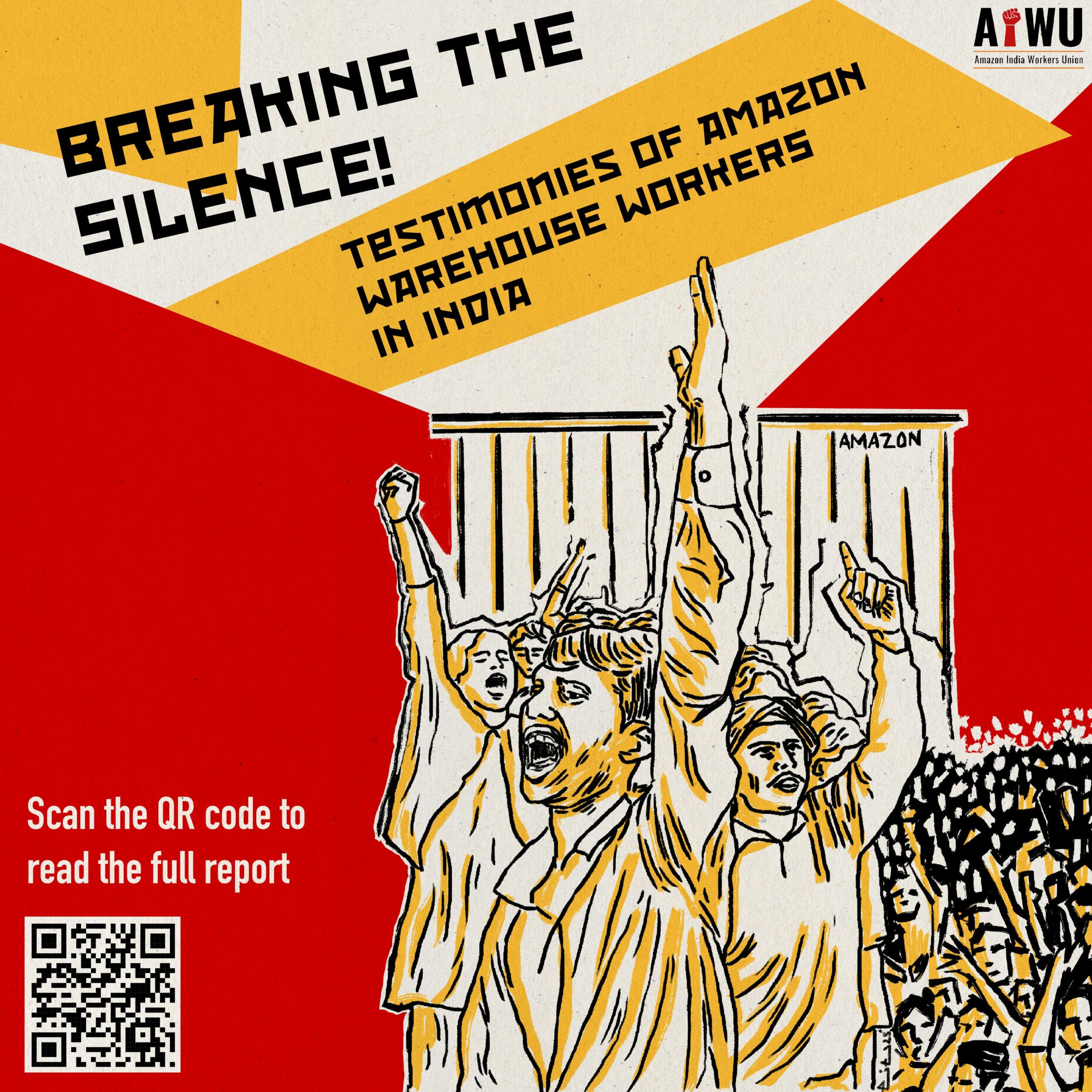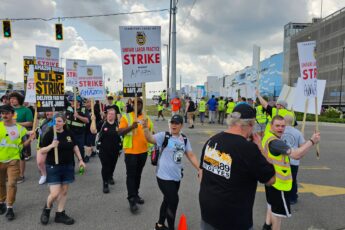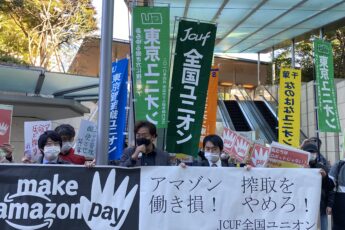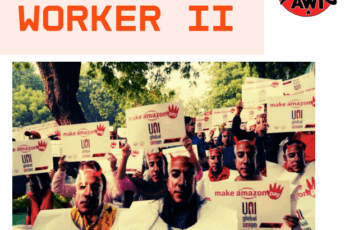
Download the full Report by AIWU here: “Breaking the Silence”
In April, we met Amazon India Workers Union (AIWU) organizers at the Amazon Workers International (AWI) meeting held in Leipzig. We are now republishing “Breaking the Silence”, a powerful report by AIWU that collects firsthand testimonies from DEL4 warehouse workers in Gurugram, south of New Delhi, exposing the everyday exploitation and the human cost behind Amazon’s global success.
Despite the peculiarities, the report reveals a common trend: workers endure relentless pressure, long hours on their feet, and constant surveillance through AI-driven systems like ADAPT. Many have migrated from far-off states in search of stable employment, only to be treated as disposable labor, without job security and fair treatment. Short-term contracts are the norm, and speaking out often leads to retaliation. Amazon’s refusal to engage with unions aims at leaving workers without a collective voice or means to demand change. The report also highlights the conditions of women working in Amazon warehouses, facing retaliation and pressure for going to the toilet or for having to take a break, calling relatives who could take care of their children if they get sick.
Yet, despite these conditions, workers are organising. Their demands are clear and basic: stable jobs, fair pay, safe working conditions, and the right to organize without fear.
The struggle is not unique to India. It reflects a global situation in warehouse work, where corporate profits come at the cost of workers’ well-being. But workers are pushing back—organizing transnationally, from India to Germany and beyond. Global days of action and strike, like #MakeAmazonPay, send a powerful message: no worker is too small to strike the giant, and no corporation is too powerful to be challenged.
These testimonies are not just about hardship. They are a call to action.
From Ankita’s diary: When I went to the company in the morning, all the packers were standing in the team assembly area. The manager told the target to all the packers, after that, all the packers started with their work. Because of Diwali (Indian Holiday in October/November with a peak in sales), there was a lot of pressure on all the employees. No matter how much work you do in the company, their targets generally cannot be achieved and they never end. The PS started checking the rates of the packers. Workers who failed to meet the set targets were made to stand separately. Then they were asked to go home. Some of those girls went to the washroom. I also went to join them in the washroom. When I arrived there, I saw that all those girls were in tears. When I managed to talk with them, they explained that they had come here from very far to work. The salary is Rs. 10,000, there is no direct joining of the company; only fixed-term contracts through subcontracting agencies. If there is an interview today, the call comes in 2 weeks or 1 month later, and there is pressure in the company. They are working for 10 hours under strenuous conditions, standing the whole day without being allowed to sit. This is what those female colleagues told me, and said that it is like a jail here: They are locked up in the warehouse, but at the same time, they can also suddenly get fired by the company. They tell us to either work hard or resign. We therefore cannot meaningfully raise any work-related issues. The decisions are taken independently by the workers and we are dependent on the goodwill of supervisors and management, as they can make you redundant from one day to the next.
Sagar: My name is Sagar Kumar. I am 24 years old and I originally come from the Saran district in Bihar, where I lived with my parents and three sisters. My father works as an agricultural labourer in the village. After the marriage of one of my sisters, the financial condition of my family deteriorated. Then the lockdown was imposed due to the COVID-19 pandemic. Under those conditions, I had to face many more problems, due to which I could not complete my studies. Due to the poor financial condition of my family, my parents suggested finding work outside the village. I then met a friend from my village who was working for Amazon in Haryana. He told me about the company, and I decided to join him for work at Amazon and stayed with him in Manesar, Gurugram, in a settlement close to the DEL4 warehouse. He informed me that recruitment for part-time employment at the Amazon DEL4 warehouse is ongoing. After contacting the middlemen, I received a call from the subcontracting firm Om Enterprises. After ten days, I finally got a call from Amazon DEL4 for signing up. To get a shift at the warehouse, I had to book available working slots. I tried to book a slot every day, but I faced a lot of trouble booking them. I had to keep my mobile in my hand even during work at the warehouse to check for available slots. However, there were far too few slots to meet the demand of subscribed part-time workers. After a few days, I felt that I was not able to meet my expenses through this part-time job, as I only managed to get two or three shifts per week, so I had to look for an alternative job. For day shifts, I received Rs. 616 and for night shifts, Rs. 728. I then applied for work at the DEL5 warehouse in April 2021, which is situated in Binola, also situated in Gurugram district. I worked there for three months, after that I transferred to Lucknow to work at the Amazon warehouse LKO1. I worked there for another four months. After that, my health suddenly deteriorated, and I had to go to the hospital. This led to my access card to enter the warehouse being blocked. I handed in my medical report to HR, nevertheless they did not unlock the access card to the warehouse. My friend called me and suggested going back to Haryana, where I joined him again, and I gave an interview through the subcontracting agency BSHR to work at the DEL4 warehouse. After eight days, I received a call from Amazon to join. I was called in the evening. When I arrived at the company in the evening at eight o’clock, they took me inside along with other prospective workers. I was given a temporary badge for access. I had to load trucks, standing and working for 10 hours straight, apart from two breaks of 30 minutes, which also included queuing and standing at the canteen.
Hina: My name is Hina, and I am 23 years old. I am from Uttarakhand, but to find a job, I came to the Gurugram district. My friend worked at Amazon in Manesar, and I thought of applying there too because it is a large company and I expected to get good work. Joining Amazon involved a recruitment process, which was extensive. When I was called to the company, I first went through an interview. On the first day, they introduced us to the company, and the next day, they explained which department we would be assigned to. After four hours of training, we were put straight to work on the third day. I was sent to the fulfilment centre dock, where the workload is immense.
At the FC dock, we have to load and unload trucks, and the pressure is very high. The company constantly demands high performance, regardless of how much work you actually do, you still receive negative feedback.
The pressure of targets has a physical and mental impact on us. There’s hardly any time to talk to anyone, and the stress affects our well-being significantly; sometimes we even faint from exhaustion. When that happens, they do not send us home and there are no safety measures in place for us. We stand all day without any opportunity to sit, and there is no arrangement for resting or using the toilet conveniently. We have to sneak in time to go to the toilet ourselves. Even when we go to the cafeteria, we only get about 15 minutes out of a 30-minute break due to queuing and transfer time. I’ve been working at the company for three years. The employees often face a lot of pressure and I experienced some troubling situations as well. I was, for instance, accused for an object having gone missing. The company’s PA and PS started harassing me, repeatedly bringing up the same matter. When I approached HR for help, the situation improved a bit as the harassment stopped. However, my friend, who also works in the same department, addressed her PS about ongoing pain. The PS, citing my friend’s failure to meet targets, reported her to HR, who then forced her to resign. A few days later, while I was reviewing the floor, a shipment was mishandled under my ID. Ten days later, the SLP (Security and Loss Prevention) team called me in to ask how the shipment went missing and pressured me to admit the fault on my behalf in written form. I refused to do so. When my agency contacted me, they also asked me to write a statement, but I still refused. The next day, when I returned to the company, my ID card was blocked. When I inquired with HR, they told me the same thing: to submit in written form a statement that the mishandling had been my fault in order to unlock my card. The following day, I received a notice from the agency blaming me for the situation. I reported the incident to the AIWA team, and after everything that happened, I went to the labour court to present my case regarding the treatment I received from the company. The next day, when I returned to the company, my ID was still blocked, but the AIWA team provided significant help to support my cause.





